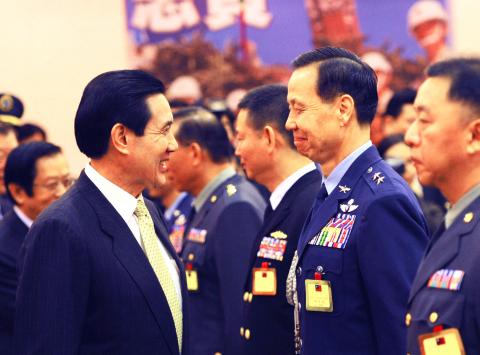President Ma Ying-jeou (馬英九) yesterday in an address to military personnel stressed his definition of Taiwan-China relations as a “special relationship,” and said that the military must recognize the status of cross-strait relations while prioritizing its duty to ensure national security.
“The Constitution states that the Republic of China [ROC] government is a sovereign state. ‘Mainland China’ is part of the ROC’s territory in accordance with the Constitution. However, Taiwan cannot deny the existence of the Chinese government being the de facto authority on the mainland,” he said.
“Cross-strait relations are non-state-to-state relations. It is a special relationship because the two sides do not recognize each other’s sovereignty, but would not deny each other’s existence ... How do we promote cross-strait relations if we don’t have such recognition?” he said in a speech to a military promotion ceremony held by the Ministry of National Defense at the Armed Forces Officers’ Club in Taipei.

Photo: CNA
Reiterating his “three noes” policy, Ma said the government would continue to promote cross-strait relations and peace across the Taiwan Strait under the basis of the (so-called) “1992 consensus.”
“The cross-strait status is defined in accordance with the Constitution, and the two sides of the Taiwan Strait are able to put aside disputes and pursue a win-win situation by promoting peace across the Taiwan Strait,” he said.
The “three noes” are a policy proposed by Ma in 2008: no pursuit of unification, no Taiwanese independence and no use of force in handling cross-strait relations.
Ma’s reiteration of cross-strait relations came after New Party Chairman Yok Mu-ming (郁慕明) called on him to push ahead with cross-strait negotiations on unification and abandon his “three noes” policy.
Yok, whose party favors unification, also expressed concern about Ma’s low approval ratings amid public discontent over the government’s performance, and suggested that Ma should not seek re-election as Chinese Nationalist Party (KMT) chairman so he can focus his efforts on national affairs.
Ma insisted that his administration would pursue cross-strait peace while maintaining the “status quo” across the Strait.
He said the military would maintain a small, but strong force to ensure the nation’s security.
He also called on military personnel to maintain integrity as a basic standard, while promising that the government will make more of an effort to take care of veterans amid concerns about the cutting of year-end bonus for some retired civil servants and military personnel.

ANOTHER EMERGES: The CWA yesterday said this year’s fourth storm of the typhoon season had formed in the South China Sea, but was not expected to affect Taiwan Tropical Storm Gaemi has intensified slightly as it heads toward Taiwan, where it is expected to affect the country in the coming days, the Central Weather Administration (CWA) said yesterday. As of 8am yesterday, the 120km-radius storm was 800km southeast of Oluanpi (鵝鑾鼻), Taiwan’s southernmost tip, moving at 9kph northwest, the agency said. A sea warning for Gaemi could be issued tonight at the earliest, it said, adding that the storm is projected to be closest to Taiwan on Wednesday or Thursday. Gaemi’s potential effect on Taiwan remains unclear, as that would depend on its direction, radius and intensity, forecasters said. Former Weather Forecast

As COVID-19 cases in Japan have been increasing for 10 consecutive weeks, people should get vaccinated before visiting the nation, the Centers for Disease Control (CDC) said. The centers reported 773 hospitalizations and 124 deaths related to COVID-19 in Taiwan last week. CDC Epidemic Intelligence Center Director Guo Hung-wei (郭宏偉) on Tuesday said the number of weekly COVID-19 cases reported in Japan has been increasing since mid-May and surpassed 55,000 cases from July 8 to July 14. The average number of COVID-19 patients at Japan’s healthcare facilities that week was also 1.39 times that of the week before and KP.3 is the dominant

The Chinese Communist Party’s (CCP) working group for Taiwan-related policies is likely to be upgraded to a committee-level body, a report commissioned by the Mainland Affairs Council (MAC) said. As Chinese President Xi Jinping (習近平) is increasingly likely to upgrade the CCP’s Central Leading Group for Taiwan Affairs, Taiwanese authorities should prepare by researching Xi and the CCP, the report said. At the third plenary session of the 20th Central Committee of the CCP, which ended on Thursday last week, the party set a target of 2029 for the completion of some tasks, meaning that Xi is likely preparing to

US-CHINA TRADE DISPUTE: Despite Beijing’s offer of preferential treatment, the lure of China has dimmed as Taiwanese and international investors move out Japan and the US have become the favored destinations for Taiwanese graduates as China’s attraction has waned over the years, the Ministry of Labor said. According to the ministry’s latest income and employment advisory published this month, 3,215 Taiwanese university graduates from the class of 2020 went to Japan, surpassing for the first time the 2,881 graduates who went to China. A total of 2,300 graduates from the class of 2021 went to the US, compared with the 2,262 who went to China, the document showed. The trend continued for the class of 2023, of whom 1,460 went to Japan, 1,334 went to